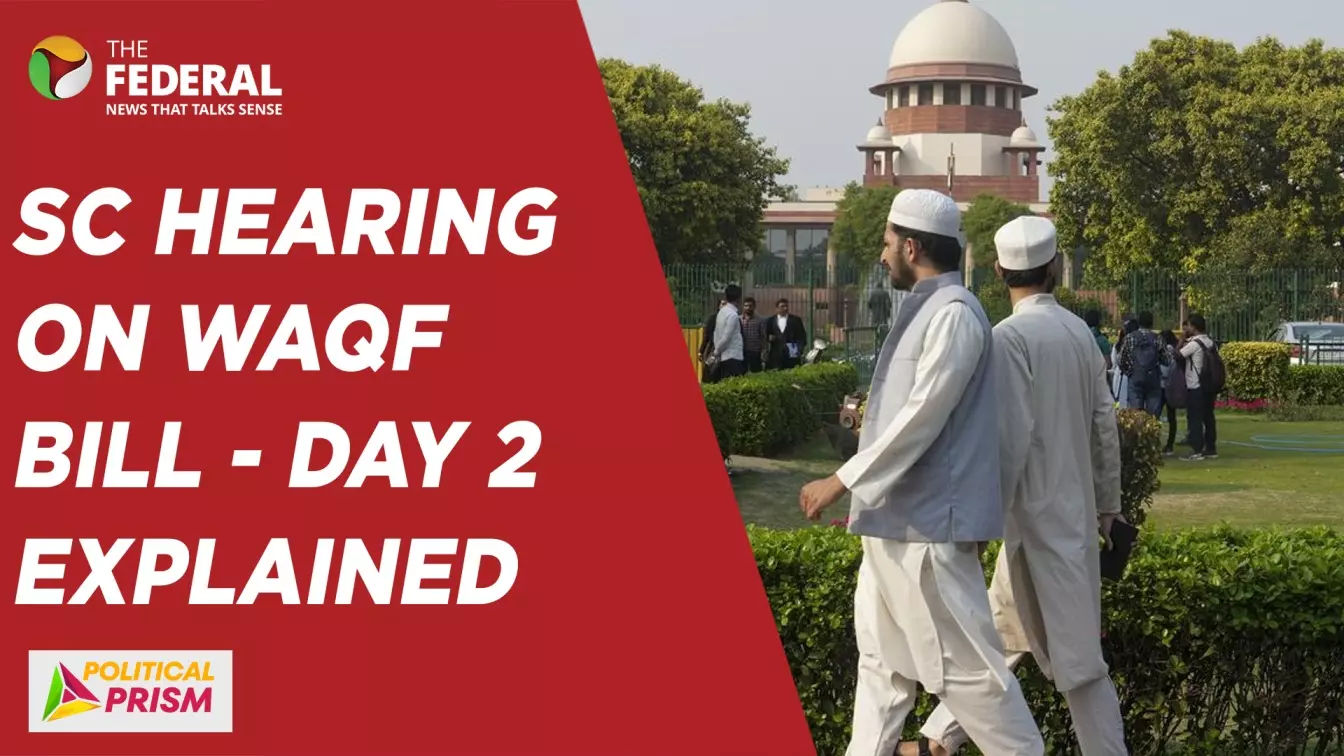
Day 2 of SC hearing on Waqf Act
After SC rap, Centre agrees to status quo on 'waqf by user' till next hearing
No Waqf board appointments, no change in property status—SC tells Centre to hold till May. Is a rollback loading?

On the second day of hearings in the Supreme Court on petitions challenging the Waqf (Amendment) Act, 2025, the Centre offered key assurances to the court—leading to a temporary halt in the implementation of controversial provisions of the Act. In The Federal’s Political Prism show, hosted by Puneet Nicholas Yadav, the second day of the Waqf hearings was analysed in depth. The Supreme Court, while refraining from issuing a stay, recorded that appointments to Waqf Boards and the reclassification of Waqf properties would be put on hold until the next hearing, likely to be held in the week starting May 5.
The apex court was hearing over 100 petitions that challenge the constitutional validity of the amended Act. The petitioners include political leaders, religious organisations, and individuals who argue that the new law violates their rights and alters the fundamental structure of religious endowment governance.
No appointments for now
One of the most contentious provisions of the amended Act was the government's power to nominate non-Muslims to state Waqf Boards and the Central Waqf Council. This had drawn criticism from across the political spectrum and from Islamic organisations.
Also read: 'Waqf by user': What does it mean? Why SC raised concerns over it?
Today, Solicitor General Tushar Mehta, appearing for the Centre, told the Court that no such appointments—Muslim or non-Muslim—would be made until the next date of hearing. The court took this assurance on record.
The provision under scrutiny arises from Sections 9 and 14 of the Act, which allows for multiple government nominations, potentially diluting the religious character of the boards.
No change in property status
The second major point of contention was the treatment of “Waqf by user”—a traditional form of oral endowment practice. The new law prohibits recognition of such waqfs unless registered through a formal deed.
Petitioners argued that this invalidates centuries-old practices and could lead to mass denotification of religious properties. The Supreme Court had on Wednesday expressed concern over this and hinted at issuing a stay.
Today, the Solicitor General assured the Court that no waqf property—whether oral (waqf by user) or written (waqf by deed)—would see a change in character or ownership till the next hearing. The government would not denotify or reclassify any such properties during this period.
Disputed properties
The third issue the court had raised on the previous day related to disputed properties. The Act allows the government to claim any waqf property as public land and initiate an inquiry through the district collector. During the inquiry, the land would be treated as government land by default.
While the court didn’t explicitly restate its position on this issue on Thursday, lawyers present argued that the Centre’s broader assurance not to change the character of any waqf property implies that this contentious proviso too would not be implemented for now.
Next hearing in May
The Centre has been given seven days to file a formal response to issues raised by the petitioners. The petitioners, in turn, have five days to submit rejoinders. The next hearing has been scheduled for a date in the week starting May 5.
The court has also instructed all petitioners to consolidate their efforts. Of the 100+ petitions, five will be treated as the lead cases, and the rest will be considered applications in support. The case will now be referred to simply as “Waqf Amendment Act,” without individual petitioners' names.
Lawyers have been asked to coordinate and appoint nodal counsel who will present arguments going forward.
Temporary respite
The court’s direction has been viewed as a temporary relief for petitioners who feared irreversible changes if the Act were enforced in full. While the Court did not issue a blanket stay on the law, its tone and insistence on status quo indicates judicial caution.
The Solicitor General indicated the Centre will present specific examples of alleged waqf misuse in its response. "Villages after villages have been declared waqf without justification," he claimed.
Also read: Waqf Act row: 3 dead in Murshidabad violence; HC orders deployment of central forces
Meanwhile, petitioners continue to argue that the Act infringes on religious freedoms and institutional autonomy. Several Muslim leaders and religious bodies have welcomed today’s development as a positive step.
Awaiting deeper scrutiny
The court clarified that it is only at the preliminary hearing stage, and that final adjudication would follow detailed arguments. The broader question of whether the Act can withstand constitutional scrutiny remains open.
Until then, the status quo will be preserved—no appointments to boards, no change in property character, and no enforcement of controversial clauses.
The content above has been generated using a fine-tuned AI model. To ensure accuracy, quality, and editorial integrity, we employ a Human-In-The-Loop (HITL) process. While AI assists in creating the initial draft, our experienced editorial team carefully reviews, edits, and refines the content before publication. At The Federal, we combine the efficiency of AI with the expertise of human editors to deliver reliable and insightful journalism.

